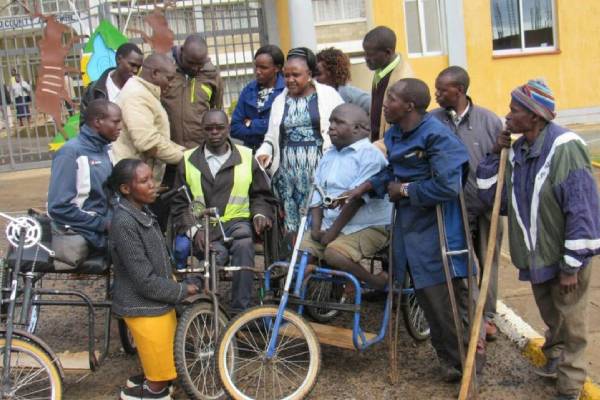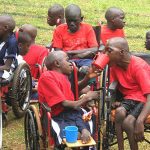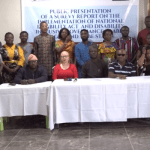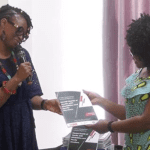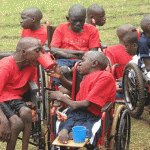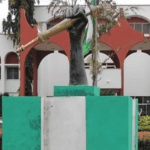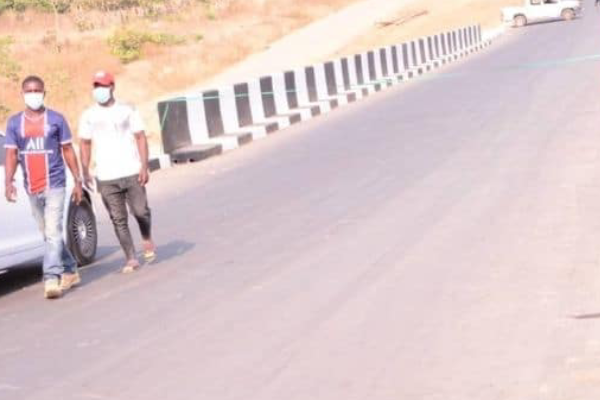Three years after the proposed disability legislation took effect in Nigeria; report indicates most of the 31 million persons living with disabilities have remained victims of neglect, abuse and stigma.
(But) their circumstance is none of their making; if they don’t look out for themselves, no one probably will.
Many persons especially children with special needs are desperate for inclusion but this remains a mirage as they have no means of making this happen.
According to the United Nations Population Fund, UNFPA, an estimated 32 million people in Nigeria including children live with one form of disability or the other, and face different types of discrimination which include having limited access to basic social services like health care and education.
Nat sound (shots of children on the street), aerial shots, music.
In Ibadan, the city of many firsts, and the larger Oyo state, persons with special needs are still overlooked. In search of answers, this journey takes me to Ariori, a village on the outskirts of Ibadan.
Even for those without special needs or disability, transportation is such a difficulty. The village is only partly motorable with few motorcycles plying the route. It is nearly a ghost town until you find the Network for People with Special Needs where no fewer than thirty-six persons have enrolled.
Among them is 13-year-old Fawaz Kasali and his best friend.
Relating his story was a real act of courage – the memories of his past are still vivid in his mind and they are also too painful to tell.
He tells me he went on holiday after school term some years back. The night was dark and suddenly he discovered he could not see anymore.
His grandmother took him to the hospital but that didn’t help, the situation gave him another challenge. Although he can see now, he can’t walk. Since that year, his education stopped.
He’s one of the few who have found a way around rejection to remain on the path to a desired future.
“The school in Oleyo said they couldn’t accept me with my condition. I started staying at home after that experience. I stayed for a long time doing nothing. Luckily, I got a helper. He brought me to this place.
Since I got here, I have learnt a lot. I attend classes and learn how to make purses. I have many friends here, my best friend is Lekan, he helps when I want to do anything. With education now, I can become an accountant”.
Longing for a Mother’s love
18-year-old Odun’s story is a little different. She was left on the streets of Ibadan to beg for alms and fend for herself without a wheelchair and school enrolment. She got lucky in 2020 after she was discovered by a non-governmental organization who assisted her with the wheelchair she now uses and connected her with the Network for People with Special Needs. For now, she has a wheelchair but struggles to catch up on the years lost on the streets. But she longs for something even deeper than a chair and lessons.
Bamiji Waris had lived with his blind grandmother but their neighbours saw no better use for him than to get him drunk, have him sing and watch him dance. With his grandmother now dead, he has no one to check on him. His only connection to people outside here is when students are going out on excursion and the home is being visited.
From outside, not much is seen, just a building with banners and mini playground by the side.
Ms Sekinat helps with education, rehabilitation, vocational training, sports and social skills. Although she enjoys caring for persons with special needs, maintaining the place costs about one million naira every month.
With a background in education and volunteering, the joy she’s put on the faces of persons under her care keeps her going, tailoring her life to be like the Mother Theresa of Africa, but she needs all the support she can get to care for the children.
With the passage of the Oyo State Persons Living with Disability (Amendment) Bill, 2022 in October, better days may be ahead.
The number of out-of-school children is on the increase.
Almost two years after the United Nations Children’s Fund (UNICEF) declared that about 10.5 million children were out-of-school in Nigeria, the number has risen to 18.3 million children. While it is somewhat easy to track children without disability and get them in school, it is difficult to find children with disability because they are hidden, even when they are found, the needed care and cost of access are prohibitive.
The Save the Children international estimates that 95.5% of children with disabilities in Nigeria are out of school and have low knowledge of sexual and reproductive health (SRH) issues, including HIV/AIDS due to poor communication.
From Oyo state, I travel to neighbouring Osun state where the path to inclusive education in appears to be filled with challenges from weak structures to lack of resources and the proliferation of separate education systems for persons with special needs. For those who get a government funded school, infrastructure poses a big challenge.
In Ijesa, the school for special needs children at Enu-odi, was founded in the 1970s, but only now bears the rust of many years.
Not much has changed in its 43-year history. From the entrance to the school, you see how difficult it is for children with special needs to access the facility. This is the irony for a school meant to be easily accessible.
With the help of this gaped iron gutter guard, you go through the narrow path into the school, children attending this school need to be aided in and out of school.
The sight of our camera is thrilling for most of the children. Today is not one of those days when rainfall disrupts learning.
The sun shines brightly over them, the students are more than happy to learn with limited furniture. The school caters to four categories of children: the hearing impaired, visually impaired, intellectually impaired and physically challenged.
Their teachers are listless, everyday they struggle to meet up with the growing needs of the children, worrying about bad toilets, dilapidated classrooms, limited learning materials, inadequate uniforms and poor incentive systems. Since 2018, this advocate has spent over N6 million paying salaries of at least three teachers, buying school uniforms for 80 students and providing for indigent ones. Out of the six structures in the school, this is only building with a ramp.
It’s breaktime, the students are waiting for the food vendor since their school is part of the federal government’s school feeding programme.
Like some other days, the food vendor is nowhere to be found, the headmistress is used to situations like this, from donations and personal contribution she manages to give them some snacks for break.
The buildings are dilapidated, roofs in some classes are already leaking. Since it’s a school for day and boarding students, more facilities are needed. In 2017, the Rauf Aregbesola administration had attempted to build another facility but it’s still a locked dream for the teachers and children.
The limited available data on the educational status of children with disabilities consistently shows that they are far more likely to be out-of-school than children without disabilities
Advocates are campaigning for better conditions and adequate learning materials like provision of Braille textbooks for the Blind Pupils in Osun state.
Of the estimated 65 million primary and secondary school age children with disabilities, at least half of them are out of school. They experience barriers in enrolling, attending, participating, and learning at school. Estimates suggest that more than 85% of disabled primary-age out of school children have never attended school. On average, one in three children with disabilities of primary school age is out of school, compared with one in seven children without disabilities.

